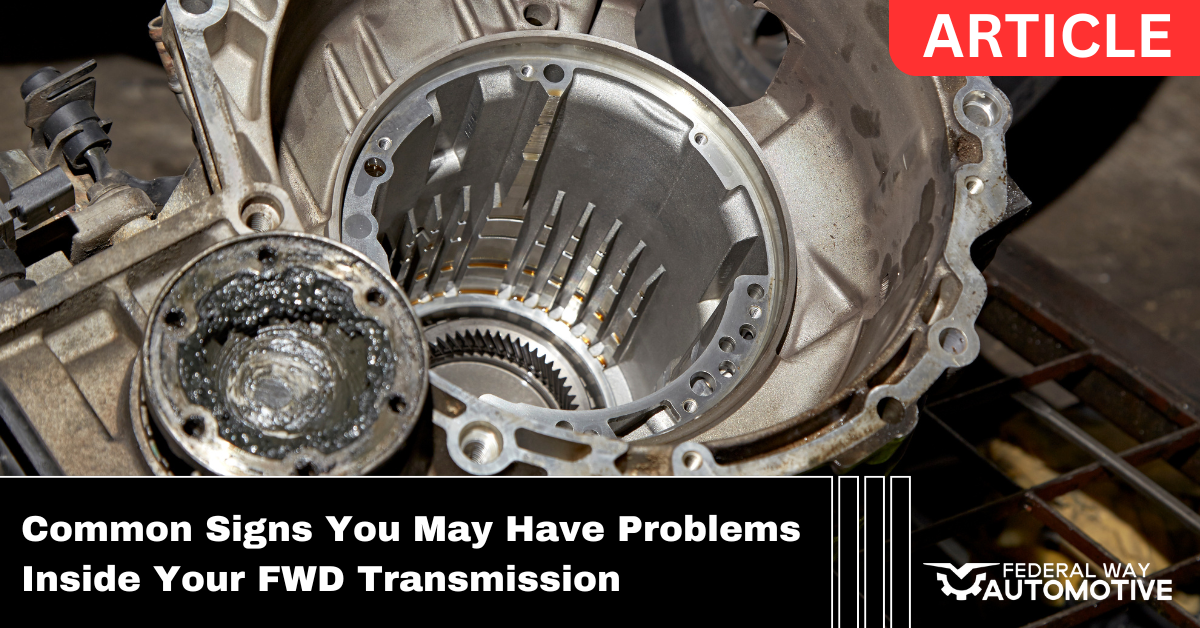When it comes to diagnosing FWD transmission problems, you’ve got to pay close attention to several key indicators. You might notice delayed or rough gear shifting, slipping gears, or even hear unusual noises during gear changes. These symptoms shouldn’t be taken lightly, as they can lead to more severe issues if ignored. Detecting fluid leaks and burning smells early can save you from hefty repair bills. But how can you pinpoint these problems accurately and take the right steps? Let’s explore the specifics so you can keep your vehicle running smoothly.
Key Takeaways
- Look for delayed or rough gear shifting as early signs of transmission issues.
- Identify pinkish-red stains under the vehicle as potential transmission fluid leaks.
- Listen for unusual noises like whining or clunking during gear shifts.
- Check for burning smells which can indicate low transmission fluid or overheating.
- Monitor warning lights like the Check Engine Light for potential transmission problems.
Recognizing Gear Shift Issues in FWD Cars
Recognizing gear shift issues early can save you from costly transmission repairs down the line. If you drive a FWD car, pay close attention to how your vehicle shifts gears. Delayed or rough gear shifting can often indicate FWD transmission problems.
For instance, if you notice jarring shifts or difficulty engaging into gear, these are common signs of gear shift problems that shouldn’t be overlooked.
Another red flag is slipping gears. If your car suddenly slips out of gear while driving, it could be pointing towards a serious transmission issue. Alongside slipping gears, you might experience a loss of power or a sudden increase in engine RPM during gear shifts. These symptoms can signify transmission trouble that demands immediate attention.
Recognizing issues like these in your FWD car can prevent further damage and costly repairs. Delayed shifting, where the car takes longer than usual to change gears, is another symptom to watch out for.
Identifying Fluid Leaks in FWD Transmissions
While keeping an eye on gear shift issues, it’s equally important to be vigilant about identifying fluid leaks in your FWD car. Fluid leaks, especially transmission fluid leaks, can lead to severe transmission problems if not addressed promptly.
Here’s how you can spot them:
- Look for stains under your vehicle: Pinkish-red stains are a common indicator of a transmission fluid leak. If you notice fluid under your vehicle, it’s time to investigate further.
- Check for smells coming from the car: A burning smell coming from your car can signal a problem. Transmission fluid that’s leaking and burning off can produce this odor, indicating potential issues.
- Inspect the transmission pan: Damage or cracks in the transmission pan can lead to leaks. Look for discolored fluid around this area; transmission fluid should be a clear, pinkish-red, not brown or burnt.
- Address abnormal fluid appearance: Using the transmission fluid dipstick, check for low levels and abnormal color. Discolored fluid could indicate internal damage and should be addressed immediately.
Detecting Unusual Noises in FWD Transmissions
If you hear unusual noises like whining, humming, or clunking during gear shifts, it could signal FWD transmission problems. These sounds often indicate potential transmission problems, requiring your immediate attention.
Grinding or shaking noises while driving could point to internal issues within the transmission system of your front-wheel drive vehicle. Don’t ignore these signs, as early detection is important.
Rattling or banging noises coming from the transmission area are also red flags. These sounds suggest that something might be loose or damaged within the transmission.
Humming or whining noises during acceleration could further signify potential transmission problems. Such sounds often result from worn-out bearings or other internal components that need professional inspection.
Addressing unusual sounds promptly can prevent further damage to your FWD car’s transmission. If you notice any of these noises, it’s crucial to seek a professional inspection right away. Ignoring these early warning signs could lead to more severe and costly repairs down the road.
Checking for Burning Smells in FWD Transmissions
Just as unusual noises can signal transmission problems, burning smells in your FWD car often indicate overheating of the transmission fluid. When you catch a whiff of a burnt smell, it’s a strong warning sign that something’s wrong under the hood. Overheating can result from low fluid levels or a malfunctioning transmission cooler, both of which can have serious consequences if not taken care of.
Here are four steps to diagnose and handle burning smells in your FWD car:
- Check Fluid Levels: Low transmission fluid can cause overheating. Regularly inspect the fluid levels to make sure they’re within the recommended range.
- Inspect for Leaks: Look under your car for any transmission fluid leaks. Leaks can lead to low fluid levels, causing the system to overheat.
- Examine the Cooler: A malfunctioning transmission cooler can fail to regulate the fluid temperature, leading to overheating. Inspect the cooler to ensure it’s functioning properly.
- Regular Maintenance: Conduct regular maintenance and fluid checks. This helps identify any potential internal issues early on and keeps your transmission in good condition.
Addressing burning smells promptly through these steps can prevent more severe transmission problems down the road.
Observing Slipping Gears in FWD Cars
Slipping gears in your FWD car can be a clear sign that something’s wrong with the transmission. When you experience a delay in acceleration or a sudden loss of power, it’s likely due to a transmission problem. In front-wheel drive vehicles, this issue often stems from worn clutch plates, low transmission fluid, or a malfunctioning torque converter.
You might notice your engine revving without a corresponding increase in speed, which not only diminishes fuel efficiency but also risks further damage to your transmission system. Slipping gears can make driving unpredictable and unsafe, so addressing the issue promptly is important.
Low transmission fluid can lead to inadequate lubrication, causing gears to slip. Meanwhile, worn clutch plates may struggle to engage properly, and a malfunctioning torque converter can fail to transfer power effectively from the engine to the transmission. Each of these problems requires immediate attention.
For accurate identification and resolution of slipping gear issues, a professional diagnosis is essential. Skilled technicians can determine the root cause and recommend appropriate repairs to restore your vehicle’s performance and maintain its longevity. Don’t ignore these symptoms; get your transmission checked to uphold safe driving conditions.
Inspecting Warning Lights for FWD Transmission Issues
While addressing slipping gears is important, keeping an eye on your warning lights can also help you catch FWD transmission problems early. Modern FWD cars are equipped with sophisticated onboard diagnostic systems that illuminate warning lights such as the Check Engine Light or Transmission Warning Light when there’s a problem.
These lights shouldn’t be ignored, as they’re your car’s way of alerting you to potential transmission issues.
Here’s what you should do when these warning lights appear:
- Check Engine Light: This light can indicate a variety of issues, including transmission problems. Use diagnostic tools to read the specific error code.
- Transmission Warning Light: This light is more specific and directly signals that there’s an issue with your transmission. Act quickly to avoid severe damage.
- Prompt Inspection: As soon as a warning light comes on, schedule an inspection. Early diagnosis can prevent costly repairs and maintain vehicle safety.
- Utilize Diagnostic Tools: These tools can pinpoint the exact problem, helping you or your mechanic address the issue more efficiently.
Ignoring warning lights in FWD cars can lead to severe damage. Regularly monitoring and promptly addressing these alerts can help sustain your vehicle’s longevity and reliability.
Fix FWD Transmission Problems Early and Save
In short, staying alert to FWD transmission problems can save you time and money. If you notice delayed shifts, fluid leaks, strange noises, burning smells, slipping gears, or warning lights, don’t ignore them.
Regular checks and quick action can keep your vehicle running smoothly and safely. Always consult a professional when something seems off, and you’ll extend the life of your transmission and enhance your driving experience.


